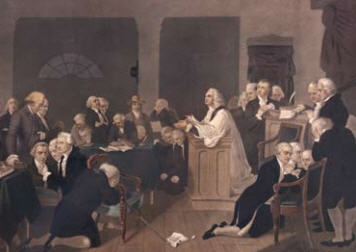Pagan activist looks to end prayer at public meetings Wants to use old legal test to ignore Supreme Court and historical precedent
Media Contact
Ryan Colby 202-349-7219 media@becketlaw.org
Additional Information

WASHINGTON, D.C. – Peter Bormuth, a self-proclaimed pagan activist with a long history of suing local government entities and nonprofits, is suing a county commission to end their right to pray before public meetings. Today, the full 15-member U.S. Court of Appeals for the Sixth Circuit heard his case, Bormuth v. County of Jackson, in a packed Cincinnati courtroom. Rejecting Bormuth’s lawsuit could dramatically clarify and improve religious liberty law, and may set the stage for Supreme Court review due to a likely conflict with a similar pending case in North Carolina.
In 2014, the Supreme Court protected the tradition of legislative prayer in its Town of Greece v. Galloway decision, which required courts to consult history to interpret the Establishment Clause. But Bormuth is trying to dodge that ruling by using the discredited Lemon test. Named after the 1971 Lemon v. Kurtzman case, the test ignores history and encourages anti-religious activists to file lawsuits against religious expression. Activists have attacked monuments to fallen soldiers and tried to scrub “In God We Trust” from currency. Justice Scalia famously compared the Lemon test to a zombie—popping up unexpectedly to frighten the small towns with lawsuits, often defeated in judicial opinions, but never quite dead.
“The Supreme Court’s 2014 Town of Greece landmark opinion finally put the zombie Lemon six feet under, where it belongs,” said Daniel Blomberg, a Becket attorney who attended oral argument today, Becket filed a friend-of-the-court brief in the case. “Small-town officials and weary judges shouldn’t be held hostage to activists determined to fight over anything that hints at religion in public life.”
Legislators have opened meetings in prayer since before the founding of the country and none of the Founding Fathers would have thought that violated the Establishment Clause. The Founders understood an establishment of religion to consist of serious problems like government control of the church, coercive attempts to push people into and out of churches, or giving certain public financial support to the church. They were not worried about a few words that someone prays at the beginning of a meetings, words that no one is forced to agree with or listen to.
In May 2017, Becket teamed up with leading religious liberty scholar and Stanford Law School Professor Michael McConnell in a friend-of-the-court brief to explain that under the Supreme Court’s new rule, the Establishment Clause must be interpreted in the same way as the rest of the Constitution: by analyzing it through its historical context.
A decision in the case is expected later this year.
For more information or to arrange an interview with a Becket attorney, contact Melinda Skea at media@becketlaw.org or 202-349-7224. Interviews can be arranged in English, Chinese, French, German, Portuguese, Russian, and Spanish.
###
Becket is a non-profit, public-interest law firm dedicated to protecting the free expression of all religious traditions and has a 100% win-rate before the United States Supreme Court. For over 20 years, it has successfully defended clients of all faiths, including Buddhists, Christians, Jews, Hindus, Muslims, Native Americans, Sikhs, and Zoroastrians (read more here).